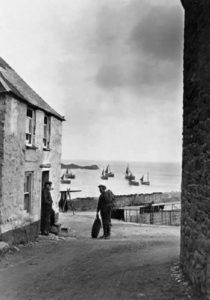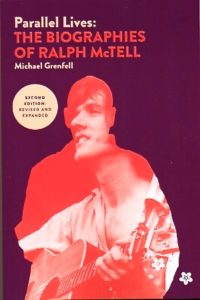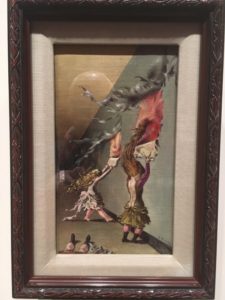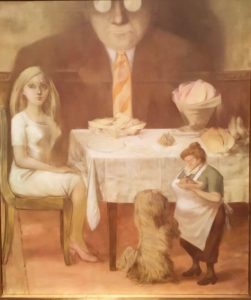Spring has crept in a little further in this part of the world: so, some lovely days and spring flowers. Trips to the countryside. However, as I write, it is pouring with rain, cold and with intermittent sleet. It must be the UK!


Whilst dwelling on pastoral matters, a FB friend posted this rather charming photo of Mousehole – my families home village – and I cannot resist sharing it here. This dear little house is now a gift shop and has been for a long while – just two doors down from the family home. I guess this would be in the 1930s.

Some focus on music this month.
Firstly, I went to see a Roy Harper gig in the splendid context of the London Palladium. It was a real London show with rock celebrities rubbing shoulder to shoulder with the general public. Roy was on form with a backing group – including strings. Apparently, a ‘farewell tour’ if not ‘farewell gig’ – well, advancing years define their own logic.

I saw Roy many times in Bristol in the early 70s. A troubadour character rather than a singer songwriter (although that as well). Often, he spoke as much as he played and could certainly tell a story. It was all very dangerous in those days. Now rather more of pathos of ‘what happened next!’. Of course, he ended with ‘When an Old Cricketeer leaves the Crease’ – that peon to Englishness, mortality, and the mystique of a game of life:
https://www.youtube.com/watch?v=OY0N8ApcUMc
Secondly, I have been writing about King Crimson and Robert Fripp – especially with respect to business and management matters. Quite interesting and shocking. In the 1950s, it was not uncommon for a manager to simply ‘employ’ a musician and pay them a wage. In the 1960s, and with the rise of The Beatles, this gave way to percentage deals with small-scale business men; often with quite a bit of both exploitation and mistakes committed. By the late 60s and into the 70s, the ‘rock star’ manager arrived: who shared in the Rock and Rock life style. In the opposite direction, some musicians became business men. The fact that they often made not a very good job of this resulted in the rise of the ‘accountant manager’. This happened with the original company that managed King Crimson and others. So, began the practice of setting up multiple accounts: and borrowing from one to finance another. This resulted in the non payment of royalties because the management company were in debt; but in debt because of monies lent to another company – that the manager also owned, and paid themselves handsome dividends from. As they say, the day the ‘bean counters’ took over in a way which was soon to affect the rest of the economy. Anyway, an iconic doorway in the Kings Road – home of EG:

Thirdly, John Beresford reminds me that it was Mothering Sunday fifty years ago that we both heard a Sunday broadcast by the then up and coming folk singer Ralph McTell. This was the first time we heard such songs asStreets of London, Daddy’s Here, and Mrs Adlam’s Angels. Obviously, we were both somewhat taken by these, and it led to a life-long attachment to this man and his music/ work.
John manages the Ralph McTell fan page on the web.
I went on to write a book about Ralph:

http://www.pomera.co.uk/books/parallel_lives_second_edition/
John and I finally met when he came south to interview me about the book:
https://www.youtube.com/watch?v=P_p9OtekKUE&feature=youtu.be
Finally, I do not normally go in for obituraries, but could not not mention sadness at hearing of the passing of Scott Walker. Originally, ‘just’ another crooner, he went on to turn an essentially conservative art form into something more than avant-garde. However, I still love the originals as well: this one his version of a remarkable Neil Diamond song:
https://www.youtube.com/watch?v=vWoHBUc4rQI
Up in London for the Anti-Brexit march.


This is England 2019. When I first came to London in the 80s it was possible to walk down Downing Street – home of the Prime Minister – and have one’s photo taken in front of No 10. Now it is barred off and with heavily armed policemen. Progress??!!

A remarkable exhibition in the Tate Modern of the surrealist painter Dorothea Tanning:


Very lively and thought provoking. She certainly did not stand still and, later in life diversified into sculpture, novels and poetry and indeed broader painting. Quite interesting to set her next to my group of female surrealists: Agar, Carrington, Af Klimt, Houghton and, of course, Colquhoun.
My book/ CD of the month both seem to deal with Landscape. First, some Estonian music:

And then the classic by Barry Lopez: Arctic Dreams. By the technique of simply describing the lives of living creatures found there – polar bears, whales, oxen – some of them of teutonic strength, he manages with great pathos to highlight their innocence and vulnerability, all whilst identifying the complexity and sophistication – as well as danger – their lives entail. It is a level of life that men are constantly eroding.

Even though the context is very different, I share with Lopez the sense of the Arctic Landscape and its creatures taking you into it on its own terms. The poetry resides simple in the awareness and recognition of its ways of life. One can never really know a landscape – no matter how many times one crosses it – and it is one where living creatures kill and are killed to maintain life; but never, as with man, simply for the sport. Life in such landscape is always the same and always changing.